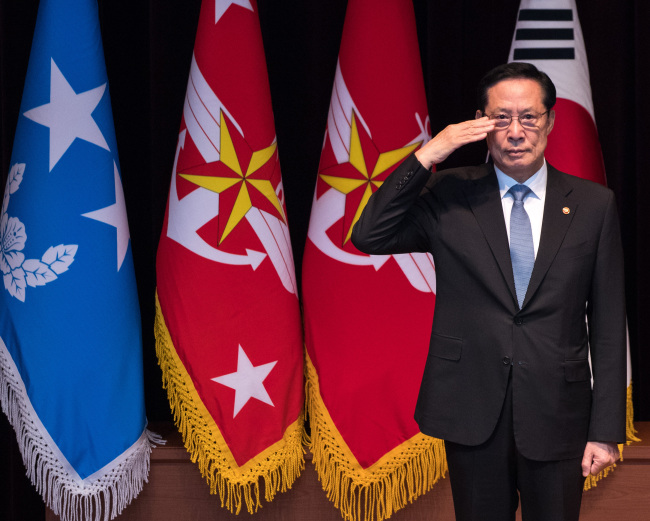Military clips intelligence unit‘s power to surveil service members
Concerns persist over whether reform measures will completely overhaul scandal-ridden security command
By Yeo Jun-sukPublished : Sept. 3, 2018 - 16:36
Since its establishment in 1950, the Defense Security Command had exercised enormous power over military affairs. At the heart of this lay its authority to monitor military personnel, keep their records and report them to their superiors. Sometimes it was involved in one-on-one briefings to presidents.
But such authority will mostly be banned under regulations governing the newly minted Defense Security Support Command. The new unit was officially launched Saturday to replace the scandal-ridden Defense Security Command.
“Monitoring activity was ridiculous authority in itself,” DSSC Commander Lt. Gen. Nam Young-sin said during a meeting with reporters Friday. “Keeping the records of personal affairs and general activities of military personnel, in principle, is forbidden.”
Gathering intelligence on military personnel is only allowed when they are accused of espionage and other major irregularities. Keeping track of high-level military officers is also permitted when they are commanding officers or subject to promotion as generals, Nam added

Asked whether the DSSC commander will brief the president or presidential staff behind closed doors, Nam said he would not have separate briefing sessions without reporting to the defense chief in advance.
The one-on-one private briefings to presidents -- reminiscent of the authoritarian administrations in the 1970s and 1980s -- were a major privilege for the defense security commanders. President Moon Jae-in has vowed not to take any form of private briefings from them.
“We are working for the minster of national defense and advise him on matters of national security and espionage. ... We will report to the minister first and then, if necessary, report to the presidential office,” said Nam.
The measures are a part of efforts to strip the military’s supreme security intelligence of its privileged authorities, which result in abusing other military branches, interfering with domestic politics and serving the interest of ruling political parties only.
The now-disbanded Defense Security Command was recently found to have drawn up a secret plan to declare martial law last year when the nation was in turmoil amid massive protests against former President Park Geun-hye.
In addition to the martial law allegation, the command has been under criticism for monitoring activities of those who lost their loved ones in the Sewol ferry sinking in 2014, to suppress the victim families’ grievance toward the Park administration’s mishandling of the incident.
“The new Defense Security Support Command is a completely different unit,” Nam said. “Every unit member feels grave responsibilities for past wrongdoings. ... We will make efforts to win back trust from the public.”
Some observers note, however, that the reform measures fall short of meeting earlier expectations, as there are no explicit clauses banning controversial activities in the new regulations.
Civilian panels had demanded the command seek a court warrant before wiretapping military phone calls for security purpose, but the new regulations do not ban such activities.
Furthermore, one-on-one briefings to presidents are not explicitly banned under the new regulations, leaving open the possibility that commander in chiefs succeeding Moon could resort to such briefings.
“It sounds like the new security command endorses wiretapping of military personnel,” said Park Hwee-rak, a security analyst and a former Army colonel. “I don’t think the reform measures eliminate public concerns about the security command.”
By Yeo Jun-suk(jasonyeo@heraldcorp.com)







![[KH Explains] Hyundai's full hybrid edge to pay off amid slow transition to pure EVs](http://res.heraldm.com/phpwas/restmb_idxmake.php?idx=644&simg=/content/image/2024/04/18/20240418050645_0.jpg&u=20240419100350)






![[From the Scene] Monks, Buddhists hail return of remains of Buddhas](http://res.heraldm.com/phpwas/restmb_idxmake.php?idx=652&simg=/content/image/2024/04/19/20240419050617_0.jpg&u=20240419175937)

![[KH Explains] Hyundai's full hybrid edge to pay off amid slow transition to pure EVs](http://res.heraldm.com/phpwas/restmb_idxmake.php?idx=652&simg=/content/image/2024/04/18/20240418050645_0.jpg&u=20240419100350)

![[Today’s K-pop] Illit drops debut single remix](http://res.heraldm.com/phpwas/restmb_idxmake.php?idx=642&simg=/content/image/2024/04/19/20240419050612_0.jpg&u=)